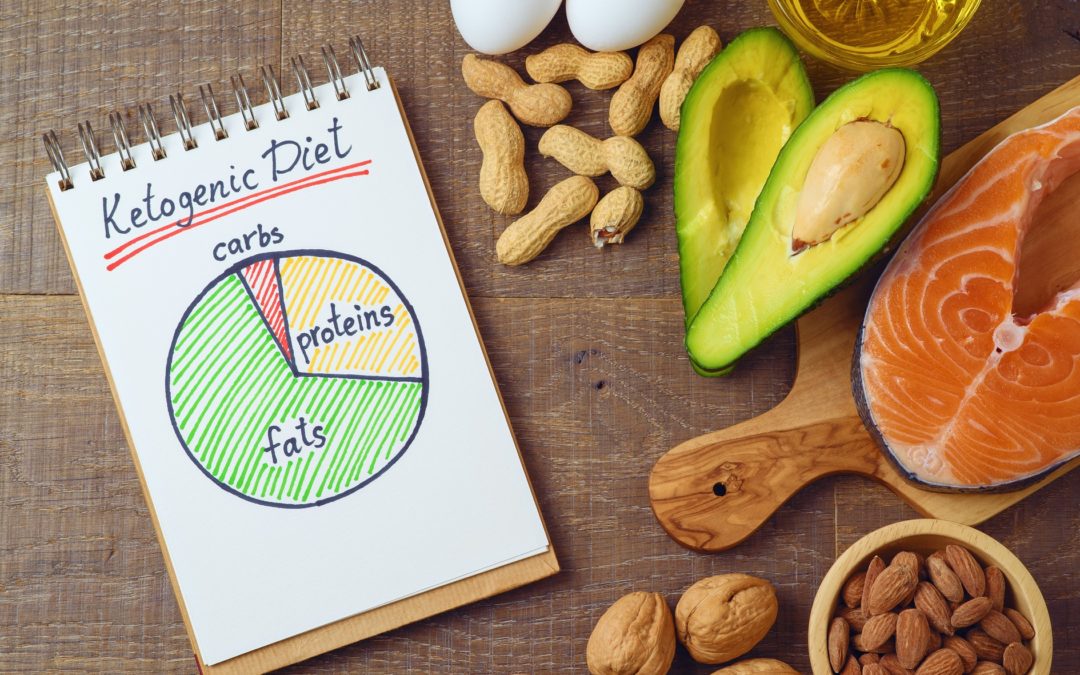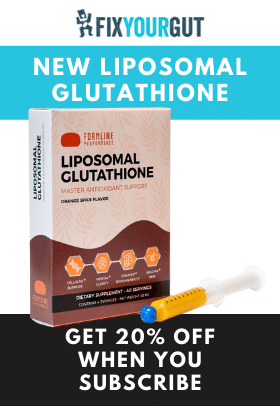Eating a diet lower in carbohydrates is quite popular. I believe that low carb diets, very-low carb diets, and even no carb diets (carnivorism) do have their place in improving the health of many people, but ketogenic diets must be followed correctly. Jason Hooper has blogged about the effect of low carb dieting and the gut, and I agree with him that it creates shifts in the gastrointestinal microbiome. For some the microbiome shift might improve their digestive health, for others, it may compound problems including Bacteroidetes dysbiosis which can lead to bloating and digestive issues. What are some recommendations I can give people and some of my clients that choose to follow a lower or no carbohydrate diet so that they can make their diet as optimal as possible?
Ketogenic Diets and Your Health
Carbohydrates are biomolecules that consist of carbon, oxygen, and hydrogen atoms. Those biomolecules form a group of differing sugars, starches, and cellulose. Carbohydrates are a primary source of energy for the body because most can be metabolized into monosaccharides, which glucose, one of the most important sources of fuel for many organisms including humans is one. Though one of the most important sources of fuel for our cells is glucose, most cells can also use ketones for fuel which are produced from the metabolism of fat. There are many medical reasons for the necessity of consuming a low dietary amount of carbohydrates, adopting what is known as a ketogenic diet. Many people with seizure disorders, cancer (glucose mainly metabolizing cancer cells), diabetes, and morbid obesity have used lower carbohydrate diets medically with differing degrees of success (mostly positive). Furthermore, ketogenic diets are medically prescribed for children with pyruvate dehydrogenase deficiency, and glucose transporter one deficiency syndrome. Both diseases prevent the body from adequately using glucose for metabolism, so using only ketone bodies for energy can improve outcomes.1 2 3 4 5 6 7
Many people follow a ketogenic diet to improve cognitive function, reduce or eliminate seizures, or alleviate brain fog. Neurons are cells that receive, process, and transmit impulses through electrical and chemical signals. The human brain contains about 85-86 billion neurons, and neuronal health is crucial for proper brain function and our health. Our brain cells can use glucose, ketone bodies, and lactate for fuel, with differing degrees of utilization. When people follow a ketogenic diet they ingest significant amounts of fat than a standard diet which is oxidated by our liver mitochondria to produce ketone bodies. Ketone bodies cross the blood-brain barrier, fatty acids poorly cross the blood-brain barrier and are not used by our brain for energy very well. Ketone bodies can be used by the neuron mitochondria to produce energy. Ketone bodies are converted to acetyl-CoA by D-β-hydroxybutyrate dehydrogenase, acetoacetyl-CoA-thiolase, and acetoacetate-succinyl-CoA transferase that enter the Krebs cycle within brain mitochondria, leading to the production of adenosine triphosphate (ATP).8 9 10 11 12
Ketone bodies have been shown to improve and lengthen neuronal health, reducing neural glutamate excitability (which explains its efficiency for seizure reduction, enhancing GABA (gamma-Aminobutyric acid) recycling and utilization, increase neural mitochondrial ATP production without increasing oxidative stress, and increased production of nicotinamide adenine dinucleotide phosphate (regenerates glutathione which inactivates mitochondrial reactive oxygen species formation) which reduces oxidative mitochondrial and neural stress. Following a ketogenic diet increases, ketone utilization by the brain and in some very restrictive ketogenic diets might be the main source of fuel for brain neurons and it doing so improve their lifespan and health. Finally, ketogenic diets may increase circulating adrenaline which may also increase mental alertness and sharpness as well.13 14
Lower carbohydrate diets do have some drawbacks for some people, that require more dietary carbs to be consumed daily or more frequent refeeds. Refeeding is when you ingest one hundred to three hundred grams of carbohydrates at least one day weekly to replenish liver glycogen storages. Ketogenic diets might worsen health issues including adrenal fatigue, hypothyroidism, and hormonal irregularity. For example, an increased need for cortisol to start gluconeogenesis can cause problems for people with low cortisol production. Ketosis also increases the amount of circulating adrenaline in the body, especially during the first few days. If ketogenic diets make you feel more anxious, shaky, trouble sleeping, then it might occur because of these issues. The increased need for cortisol and adrenaline production may cause adrenal fatigue or worsen it. Fasting and ketogenic diets over time can increase sex hormone binding globulin (SHBG) leading to decreased sex hormone utilization. Finally, low carb diets may worsen hypothyroidism because insulin is one of the hormones the body needs to convert the inactive T4 thyroid hormone to the active T3 thyroid hormone. Body insulin levels are low on a ketogenic diet which might mean less thyroid hormone conversion, causing or worsening hypothyroidism.15 16 17 18 19 20 21 22
Ketogenic diets seem to help improve neuronal function in our brains. However, our brain contains other cells known as glial cells that prefer glucose, which might be another reason refeeds are important (cyclic ketogenic diet) for proper long-term neural function on a ketogenic diet. Some people do report that their improved cognitive function on ketogenic diets start to lessen the longer they stay on a ketogenic diet and sometimes may become worse than when they started the diet in the first place. There are many different reasons for ketogenic diets worsening health, ranging from microbiome shifts, and developing or worsening of adrenal fatigue and thyroid function, but rarely for some people glial cell health in the brain might suffer from a long-term restriction of carbohydrates. Glial cells in the brain are important for maintaining immune function in the brain, maintaining the blood-brain barrier, insulating and holding together groups of neurons, carrying nutrients to our nervous system, and repairing our brain and spinal cord. There are more glial cells in our brain than neurons and might make up 80% of the total amount of cells in our brain!23 24 25 26
Neural glial cells known as astrocytes can sense how much glucose is circulating in the brain and in our blood and may trigger carbohydrate cravings to cause us to eat carbs to increase glucose to keep them well fed and functioning optimally. “We were misled by the fact that nerve cells apparently did not control this process, and therefore first thought it to occur passively. Then we had the idea that glial cells such as astrocytes, which had long been misunderstood as less important ‘support cells’, might have something to do with transporting sugar into the brain.” “The team used positron emission tomography (PET) scans to observe how insulin receptors act on the surface of the brain’s astrocytes. Insulin is a hormone produced by the pancreas to allow the body to use or store sugar (in the form of glucose) from carbohydrates in the food we eat. They found that if these receptors were missing on certain astrocytes, it would result in less activity in the neurons that are responsible for curbing food uptake, called proopiomelanocortin neurons. Not only that, but they found that astrocytes missing insulin receptors actually became less efficient over time in transporting glucose into the brain – particularly in a region of the hypothalamus that sends out signals that you’re full, or satiated. So it looks like glial cells, not the neurons, are the true ‘gate-keepers’ for how much sugar our brains absorb, and we now know that sugar has such a powerful influence on them, they’re seeking out sugar, rather than just passively absorbing it.”27
We do have a good meta-study that gives us clues about what a diet high in fat would do to our gut microbiome:
“Several human studies have suggested that a high-fat diet increases total anaerobic microflora and counts of Bacteroides. To specifically investigate the effects of different kinds of dietary fat on human gut microbiota, Fava et al. had subjects consume diets of varying fat content. The authors noted that consumption of a low fat diet led to increased fecal abundance of Bifidobacterium with concomitant reductions in fasting glucose and total cholesterol, compared to baseline. On the other hand, a high saturated fat diet increased the relative proportion of Faecalibacterium prausnitzii. Finally, subjects with high monounsaturated fat intake did not experience shifts in the relative abundance of any bacterial genera, but did have overall reduced total bacterial load and plasma total- and LDL-cholesterol. In line with these findings, consumption of salmon–which is high in mono and polyunsaturated fats—was not noted to alter fecal microbiota composition in 123 subjects either. Studies in rats have shown that intake of a high-fat diet results in considerably less Lactobacillus intestinalis and disproportionately more propionate and acetate producing species, including Clostridiales, Bacteroides, and Enterobacteriales. Furthermore, the abundance of Lactobacillus intestinalis is negatively correlated with rat fat mass and body weight. Microbial changes have also been shown to control metabolic endotoxemia-induced inflammation in high-fat diet consuming mice. Mouse studies have also compared the differential effects of various lipids on intestinal microflora. A comparison of lard-derived and fish oil-derived lipids revealed that Bacteroides and Bilophila were increased in lard-fed mice, while Actinobacteria (Bifidobacterium and Adlercreutzia), lactic acid bacteria (Lactobacillus and Streptococcus), and Verrucomicrobia (Akkermansia muciniphila) were increased in fish-oil-fed mice. Furthermore, lard-fed mice had increased systemic TLR activation, white adipose tissue inflammation, and impaired insulin sensitivity compared to mice consuming fish oil. The authors demonstrated that these findings are at least partly due to differences in gut microbiota between the two groups; transplantation of microbiota from one group to the other after antibiotic administration not only enriched the transplant recipient’s gut with dominant genera from the donor species, but also replicated the donor’s inflammatory and metabolic phenotypes. These results indicate that gut microbiota may promote metabolic inflammation through TLR signaling upon challenge with a diet rich in saturated lipids.”28
According to the study above a diet consisting of mainly healthy monounsaturated and polyunsaturated (omega 3) fats would increase the probiotic genus Lactobacillus, Bifidobacteria, and the probiotic species Akkermansia muciniphila. Eating a diet high in those fats would also increase colonies of the opportunistic bacteria Streptococcus. A diet high in saturated fat increases colonies of the probiotic bacteria species Faecalibacterium prausnitzii, but also increases the opportunistic bacteria genus Bacteroides and Bilophila. Finally, a diet high in overall fat like a ketogenic diet decreases lactic acid bacteria like Lactobacillus and increases the opportunistic genus Clostridiales and Bacteroides.29
The same meta-study explains how high protein, low carbohydrate and ketogenic diets like Atkins change our microbiome:
“The effects of dietary protein on the gut microbiota were first described in 1977. A culture-based study demonstrated lower counts of Bifidobacterium adolescentis and increased counts of Bacteroides and Clostridia in subjects consuming a high beef diet when compared to subjects consuming a meatless diet. With the advances of 16S rRNA sequencing, several studies have been able to comprehensively investigate the impact of dietary protein on gut microbial composition. Participants were given different forms of protein across these studies, such as heavy animal-based protein from meats, eggs, and cheeses; whey protein; or purely vegetarian sources such as pea protein. A majority of the studies noted that protein consumption positively correlates with overall microbial diversity. For example, consumption of whey and pea protein extract has been reported to increase gut-commensal Bifidobacterium and Lactobacillus, while whey additionally decreases the pathogenic Bacteroides fragilis and Clostridium perfringens. Pea protein has also been observed to increase intestinal SCFA levels, which are considered anti-inflammatory and important for maintenance of the mucosal barrier. On the contrary, counts of bile-tolerant anaerobes such as Bacteroides, Alistipes, and Bilophila were noted to increase with consumption of animal-based protein. This observation can be further supported by an independent study in which the researchers compared the microbiota of Italian children with that of children in a rural African village. Italian children, who ate more animal protein, were enriched for Bacteroides and Alistipes in their microbiota. Notably, one study comparing calorically equivalent high animal protein with high-carbohydrate/fiber plant-based diets reported that subjects’ weights on the plant-based diet remained stable, but decreased significantly by day 3 of the animal protein-based diet (q < 0.05). Although high protein/low carbohydrate intake may promote greater relative weight loss, this dietary pattern may pose a detriment to health. One study found that subjects with a high protein/low carbohydrate diet have reduced Roseburia and Eubacterium rectale in their gut microbiota and a decreased proportion of butyrate in their feces. In their study, De Filippo et al. similarly noted fewer fecal SCFAs in Italian subjects who consumed a protein-rich diet. As an interesting clinical correlate, several studies have demonstrated that IBD patients possess lower fecal counts of Roseburia and other butyrate-producing bacteria than healthy subjects. Healthy subjects, on other hand, have 10-fold more abundant E. rectale in their intestines. These gut bacterial changes may be responsible for the finding in a large participant prospective study (n = 67,581) that high total protein intake, especially animal protein, is associated with a significantly increased risk of IBD. Furthermore, several microbial genera promoted by intake of red meat have also been associated with increased levels of trimethylamine-N-oxide (TMAO), a proatherogenic compound that increases risk of cardiovascular disease."30
A diet high in protein seems to have a differing result on the microbiome depending on the source. Most people on low carbohydrate diets consume mainly animal protein sources, so I will discuss the microbiome changes from consuming animal protein sources. A diet high in animal protein appears to increase microbial diversity, it increases the probiotic genus Bifidobacteria and Lactobacilli (whey protein ingestion). According to the study, elevated dietary intake of protein also increases the opportunistic bacteria phylum Bacteroidetes, the genus Clostridia, and the genus Bilophila. A diet high in animal protein decreases the probiotic Firmicute Roseburia.31
Finally, lower carbohydrate diets, combined with higher fat and protein, increase colony forming units of microrganisms that prefer fat and protein, like Bacteroidetes and lead to a reduction in probiotic Firmicutes. For some this leads to beneficial weight loss. However, returning to a higher carb diet while having Bacteroidete dysbiosis causes bloating, brain fog, gas production and release, and further weight loss because Bacteroidetes are inefficient at breaking down carbohydrates.32
Information on How to Follow Ketogenic Diets Correctly to Improve Tolerance and Your Health
Many different lower carbohydrate diets ranging from ketogenic diets like the Bulletproof Diet to zero carb diets like carnivorism are very popular and many people are following them incorrectly which can cause or worsen health issues. If the average Amercian eats 2,000 calories daily, then based on common dietary guidelines you would consume 225 to 325 grams of carbohydrates. Even the Perfect Health Diet (the diet I follow) would be considered lower carb if you are eating only between 120 and 180 grams of carbohydrates daily. However, for the sake of this blog, these recommendations are for anyone that consumes less than 100 grams of carbohydrates daily, to help reduce the digestive and microbiome issues that some people have when following lower carbohydrate diets.
- Refeeding helps your body replenish glycogen levels, feed your microbiome, maintain hormone production, maintain adrenal function, and improve thyroid function. On refeed days you should consume 150 – 300 grams of carbohydrates depending on your activity level. You should consume different carbohydrates each meal to help refeed your microbiome including organic white rice, wild rice, purple or red rice, organic black beans, organic gluten-free oats, organic sweet potatoes, organic potatoes, organic walnuts, cassava, yam, organic dark chocolate, organic carrots and parsnips, organic avocados, and organic fruit. Eating these foods will feed your probiotic microbiome including Lactobacillus, Bifidobacteria, and Firmicutes like Roseburia. Finally, try to find any of these foods locally produced and in season if possible.33 34
Maintaining proper adrenal function while on a ketogenic diet is essential. Having a proper circadian rhythm, adequate sunlight exposure, good sleep hygiene, and having a no or low carb adrenal cocktail in the morning (silent reflux adrenal cocktail would be no carb) will help preserve your adrenal function. You can add the pH buffered vitamin C, salt, and potassium in the adrenal cocktail into a whey protein shake as well. If you are suffering from adrenal issues and need to follow a ketogenic diet medically, more frequent refeeds might be needed, but consult your medical professional for more information. Finally, I recommend avoiding large amounts of caffeine when following a ketogenic diet if you are suffering from adrenal fatigue. It might be best to forego Bulletproof coffee (if you can ingest coffee, coffee polyphenols do feed the microbiome, and it stimulates bile production which breaks down the extra fat ingestion when following a ketogenic diet) for your standard ketogenic diet of pastured eggs and bacon, grass-fed butter, and sautéed organic spinach.35 36
Most women need frequent refeeds because of their complex hormonal cascade. Proper production of the sex hormones progesterone, testosterone [minute amounts], and estrogen can be hindered by women having increased kisspeptin, a molecule that neurons use to communicate. Kisspeptin stimulates gonadotropin-releasing hormone GnRH which is released by the hypothalamus. GnRH tells the pituitary gland to release luteinizing hormone and follicular stimulating hormones which trigger the testes to produce sex hormones. Fasting causes kisspeptin levels to drop further in women because of a feedback loop that is sensitive to changes in metabolism, causing sex hormones to be produced less. Ketogenic diets can reduce testosterone in men, but it generally takes longer, and men seem to handle fasting better health wise for longer periods of time. Finally, SHBG from ketogenic dieting increases, inhibiting the function of sex hormones, causing ovulation issues and rarely failure.37 38
- Unless you are following a zero carbohydrate diet (carnivorism) ingesting a wide variety of vegetables (in season, local, and organic is best) while on a ketogenic diet can help preserve your microbiome. Probiotic bacteria enjoy the oligosaccharides, fiber, and polyphenols in herbs and vegetables, ingesting them frequently is important to maintain your microbiome (only fat, or only protein and fat diets). So, for example, the low carbohydrate food items that I can find locally in season in North Carolina in late July are: basil, cabbage, chard, chives, cilantro, collards, cucumbers, eggplant, garlic, green beans, green onions, leeks, mint, okra, oregano, parsley, peppers, sage, shallots, thyme, tomatillos, tomatoes, and zucchini. Any of these foods would help maintain the diversity of my microbiome, especially, cabbage, okra, onions, green beans, and garlic. If I tried to buy some of these at my local farmers market and rotate their use with every meal while maintaining twenty-five to fifty total carbs daily (remember to subtract fiber from daily carbohydrate total) I can maintain some of my microbiome diversity. I would also recommend steaming all goitrogenic vegetables, to further protect thyroid function on a ketogenic diet. Vegetables do contain differing amounts of antinutrients like phytic acid and lectins. However, cooking or proper preparation can reduce their effect, and vegetable ingestion is vital for our health and the overall health of our microbiome. Do not skimp on your vegetables when on a diet, feed your gut!39 40 41 42 43
- Ingesting a few glasses of high-quality wine weekly from Dry Farm Wines might help feed and maintain your probiotic microbiome. Your diet could still be very low-carb depending on the wine. A study looking at microbial DNA concentrations in the stool from ten healthy men after consuming red wine or gin showed positive microbiome changes from the ingestion of red wine. “These results suggest that the dominant genera in the intestinal microbiota of the volunteers was different at baseline and after polyphenol intake than after only ethanol intake. Moreover, the diversity of the fecal microbiota, according to the number of bands in DGGE profiles, was higher after the red wine period. We also found that phenolic compounds altered fecal microbiota, and consequently the Bacteroides/Firmicutes balance. After the red wine period, which was rich in polyphenols, there was a significant increase in the concentration of Firmicutes and Bacteroidetes in stool samples. However, no significant differences were detected in the number of Lactobacillus species after any intake period, which indicates that polyphenol or ethanol consumption had no effect on the growth of these bacteria. Similar results were reported by Tzounis et al, who found that after catechin intake the growth of Lactobacillus spp. remained relatively unaffected in an in vitro study, and by Yamakoshi et al (36), who observed no change in that genera after ingestion of procyanidin- rich extracts in healthy adults. Nevertheless, Tzounis et al recently found a significant increase in the growth of Lactobacillus spp. after a regular intake of a high-cocoa flavonol drink in both in vivo and in vitro studies. Although the Actinobacteria phyla did not change after any intake period, we found a significant increase in the Proteobacteria, Firmicutes, and Bacteroidetes phyla after the red wine period but not after the gin or de-alcoholized red wine periods, as compared with the initial washout period.”44
- Dietary supplementation of whey protein and collagen can help feed our probiotic microbiome. Bifidobacteria colonies increase when collagen and whey protein are supplemented, and Lactobacilli increase when whey protein is supplemented. Whey protein also reduces the colony formation of the opportunistic bacteria Bacteroides and non-butyrate producing Clostridia. Collagen can also be ingested through bone broth consumption, which can also help maintain the microbiome in moderation if you are not sensitive to histamine or glutamine.
- Ingestion of many different fats during a ketogenic diet can also help maintain a proper microbiome. Pastured butter or ghee consumption contains butyric acid, a short chain fatty acid that reduces opportunistic overgrowth and helps maintain mucosal barrier integrity. Avocados are an excellent source of fiber and the monounsaturated fat oleic acid which can improve our microbiome and ensure proper bile production. Bile of course is needed to help break down the extra fat consumed during ketogenic dieting. Extra virgin olive oil is also a good source of oleic acid and contains polyphenols that help maintain a probiotic microbiome. Extra virgin coconut oil can provide medium chain triglycerides (elevated ingestion of MCT’s during ketogenic dieting is common often causing its own set of issues) which help feed the bacteria in our upper gut and reduce yeast dysbiosis. Omega 3 fatty acids found in seafood and fish/krill oil can also feed probiotic bacteria (including Bifidobacteria) in our gut as well. Finally, occasional ingestion of dark chocolate can also help nourish the microbiome because of its fat, fiber, and polyphenol types and content.45 46 47
- Ingestion of low carbohydrate fermented foods including organic kimchi, organic sauerkraut, organic sour cream, kefir without added sugar, Brew Dr. kombucha, and organic whole fat yogurt without added sugar on a frequent basis can also help you maintain your microbiome and digestive health. Although kombucha might be too high carb depending on carbohydrate dietary limit. If so, consume during refeed. In addition, be wary of kombucha made from black or green tea which might have too much caffeine if you are suffering from adrenal fatigue. Happiness Brew Dr. Kombucha (made from white tea) is a good low-caffeine choice.48
- If you are following a no or very low carbohydrate diet health conditions like scurvy, increased kidney stone formation, and possible mucus deficiency which can lead to leaky gut. Supplementation of vitamin C will help prevent scurvy. If you have to follow a very restrictive ketogenic diet, ingestion of collagen, and bone broth (which all contain glycine) can feed the gut and help the body produce more mucus if you have to follow a very restrictive ketogenic diet. Reduce oxalate kidney stone formation by maintaining proper hydration, supplementation of magnesium (Bifidobacteria and Lactobacillus also favor magnesium ingestion), and healthy ingestion of salt, potassium, and vitamin C (adrenal cocktail).
- Proper fat digestion is vital if you are following a ketogenic diet and here is how to improve it.
- Some people report suffering from constipation following a ketogenic diet (while others report it relieves their constipation, go figure). For people that develop constipation, proper hydration, proper ingestion or supplementation of salt and potassium, proper magnesium supplementation, various vegetable and carbohydrate (refeed mainly) ingestion for fiber, ingestion of probiotic foods, daily walking for thirty minutes, and the use of a Squatty Potty when defecating might relieve your issues. Most of the time constipation occurs from ketogenic diets because of a possible lack of electrolyte ingestion and microbiome shifts. Supplementation of one daily serving of acacia fiber or the prebiotics GOS and arabinogalactan on occasion might bring relief as well, by maintaining the probiotic colonies of your microbiome.
- Proper stomach acid production and maintaining a low stomach pH during meals is crucial for someone following a ketogenic diet that contains more fat and protein. Ingesting apple cider vinegar frequently with your vegetables or supplementing with betaine HCL might be needed for people with hindered stomach acid production to keep their stomach pH adequately low during meals. Fixing upper gut dysbiosis like H. pylori dysbiosis, which can interfere with proper stomach pH, is crucial to handle the increasing need for a lower stomach pH to produce enough gastrin and stomach acid to help digest the added protein and fat.
- Jane B. Reece, Lisa A. Urry, Michael L. Cain, Steven A. Wasserman, Peter Minorsky, Robert Jackson. Campbell Biology, Benjamin Cummings, October 7, 2010. ↩
- http://n.neurology.org/content/49/6/1655.short ↩
- https://www.nature.com/articles/ejcn2013116 ↩
- https://www.ncbi.nlm.nih.gov/pubmed/14769490 ↩
- https://www.ncbi.nlm.nih.gov/pmc/articles/PMC3157418/ ↩
- Bollinger, Ty. The Truth about Cancer: What You Need to Know about Cancer’s History, Treatment, and Prevention, Hay House Inc., October 25, 2016 ↩
- https://www.ncbi.nlm.nih.gov/pmc/articles/PMC1325029/ ↩
- https://www.ncbi.nlm.nih.gov/pmc/articles/PMC1464156/ ↩
- https://www.ncbi.nlm.nih.gov/pmc/articles/PMC3969728/ ↩
- Patton, Kevin, Thibodeau, Gary, Douglas, Matthew. Essentials of Anatomy and Physiology, Mosby, March 16, 2011. ↩
- https://www.theguardian.com/science/blog/2012/feb/28/how-many-neurons-human-brain ↩
- Asprey, Dave. Head Strong: The Bulletproof Plan to Activate Untapped Brain Energy to Work Smarter and Think Faster-in Just Two Weeks, Harper Wave, April 4,2017. ↩
- https://www.ncbi.nlm.nih.gov/pmc/articles/PMC3969728/ ↩
- Asprey, Dave. Head Strong: The Bulletproof Plan to Activate Untapped Brain Energy to Work Smarter and Think Faster-in Just Two Weeks, Harper Wave, April 4,2017. ↩
- https://www.drlam.com/blog/the-ketogenic-diet-and-afs/34782/ ↩
- https://www.ncbi.nlm.nih.gov/pubmed/28304147 ↩
- https://www.ncbi.nlm.nih.gov/pmc/articles/PMC3680959/ ↩
- https://www.ncbi.nlm.nih.gov/pubmed/28076316 ↩
- https://www.ncbi.nlm.nih.gov/pubmed/29344467↩
- https://www.ncbi.nlm.nih.gov/pmc/articles/PMC425418/ ↩
- https://www.ncbi.nlm.nih.gov/pubmed/9030821 ↩
- https://www.ncbi.nlm.nih.gov/pubmed/835366 ↩
- Asprey, Dave. Head Strong: The Bulletproof Plan to Activate Untapped Brain Energy to Work Smarter and Think Faster-in Just Two Weeks, Harper Wave, April 4,2017. ↩
- Jane B. Reece, Lisa A. Urry, Michael L. Cain, Steven A. Wasserman, Peter Minorsky, Robert Jackson. Campbell Biology, Benjamin Cummings, October 7, 2010. ↩
- https://blogs.scientificamerican.com/brainwaves/know-your-neurons-what-is-the-ratio-of-glia-to-neurons-in-the-brain/ ↩
- https://www.ncbi.nlm.nih.gov/pmc/articles/PMC5303749/ ↩
- https://www.sciencealert.com/sugar-is-controlling-our-brains-more-than-we-even-realised-study-finds ↩
- https://www.ncbi.nlm.nih.gov/pmc/articles/PMC5385025/ ↩
- https://www.ncbi.nlm.nih.gov/pmc/articles/PMC5385025/ ↩
- https://www.ncbi.nlm.nih.gov/pmc/articles/PMC5385025/ ↩
- https://www.ncbi.nlm.nih.gov/pmc/articles/PMC5385025/ ↩
- https://www.ncbi.nlm.nih.gov/pmc/articles/PMC5385025/ ↩
- Asprey, Dave. The Bulletproof Diet: Lose up to a Pound a Day, Reclaim Energy and Focus, Upgrade Your Life, Rodale Books, December 2, 2014 ↩
- https://www.ncbi.nlm.nih.gov/pmc/articles/PMC5385025/ ↩
- https://www.sciencedirect.com/science/article/pii/S0955286313000946 ↩
- https://www.selfhacked.com/blog/what-it-means-to-keep-to-a-circadian-rhythm/ ↩
- http://journals.plos.org/plosone/article?id=10.1371/journal.pone.0052416 ↩
- https://www.ncbi.nlm.nih.gov/pmc/articles/PMC4678402/ ↩
- Asprey, Dave. The Bulletproof Diet: Lose up to a Pound a Day, Reclaim Energy and Focus, Upgrade Your Life, Rodale Books, December 2, 2014 ↩
- https://www.ncbi.nlm.nih.gov/pmc/articles/PMC4740614/ ↩
- https://chriskresser.com/do-raw-vegetables-hurt-your-thyroid-health/ ↩
- Gundry, Steven. The Plant Paradox: The Hidden Dangers in Healthy Foods That Cause Disease and Weight Gain, Harper Wave, April 25, 2017 ↩
- https://www.ncbi.nlm.nih.gov/pmc/articles/PMC5385025/ ↩
- http://citeseerx.ist.psu.edu/viewdoc/download?doi=10.1.1.892.4987&rep=rep1&type=pdf ↩
- https://www.ncbi.nlm.nih.gov/pmc/articles/PMC5385025/ ↩
- https://www.ncbi.nlm.nih.gov/pmc/articles/PMC3566565/ ↩
- Asprey, Dave. The Bulletproof Diet: Lose up to a Pound a Day, Reclaim Energy and Focus, Upgrade Your Life, Rodale Books, December 2, 2014 ↩
- Axe, Josh, Eat Dirt, Harper Weave, 2016. ↩
- https://www.ncbi.nlm.nih.gov/pmc/articles/PMC5385025/ ↩
- https://www.ncbi.nlm.nih.gov/pmc/articles/PMC3732059/ ↩
Conclusion
Ketogenic diets do have their time and place. Ketogenic diets can be especially valuable when used correctly to help remedy severe health conditions like seizure disorders and morbid obesity. The main problems with ketogenic diets are not necessarily because you are in ketosis, but because most people follow ketogenic diets incorrectly. People fail to refeed correctly for example, and their health eventually suffers. Ingestion of high fat when you are having digestive issues or are not “fat adapted” (shift in microbiome and body functionality that allows fat to be digested and utilized properly) can cause further health issues (Bacteroidetes or Prevotella dysbiosis, gallbladder failure, and liver inflammation). Infrequent refeeds can lead to hormonal issues, adrenal fatigue, and hypothyroidism. If you refeed when needed, ingest enough vegetables and fiber, and improve fat digestion, you can prevent many of the issues associated with ketogenic diets, and they can instead improve your health! Finally, I do not recommend zero carb diets or very-low carb diets (less than twenty grams daily) unless medically necessary. Ketogenic diets can be very taxing on our body and have the potential to cause permanent health issues (ask Dave Asprey, Paul Jaminet, and Jimmy Moore).49 50







Do you know if Gut Pro ships to Canada? I’ve only seen it for sale on the one site you link to. It must be a rare commodity
Good article, thanks